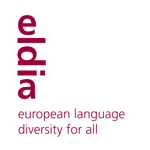The ELDIA Project and Consortium (research plan 2010)
A multidisciplinary effort to revitalize minority language, vehicular language and language maintenance studies
The European linguistic landscape is experiencing a profound transformation. Innovations and changes in language policies, education, migration patterns etc. challenge and change the roles and functions of languages within and between states, ethnic groups and nations. ELDIA (European Language Diversity for All) is an interdisciplinary research project for reconceptualizing, promoting and re-evaluating individual and societal multilingualism. Experts on applied linguistics and sociolinguistics, law, social studies and statistics, drawn from eight universities in six European countries, work together to contribute to a better understanding of how local, national and international (vehicular) languages interact in contemporary Europe. The empirical research will be conducted with a selected sample of multilingual communities, which is to cover practically the whole spectrum of different political and socioeconomic circumstances of linguistic minorities in Europe (smaller and more numerous, autochthonous or migrant communities, vigorous and endangered, highly or weakly standardized languages etc.). All these minority languages belong to the Finno-Ugric language family, which is seriously underrepresented in internationally accessible sociolinguistic literature. The results of the research project, however, will be generalizable: they will contribute to the study of multilingualism and the development of language policies in other multilingual contexts as well, in and outside Europe.
The project will develop a systematic and generalizable way of describing, measuring and evaluating the effects of the changing balances between European languages by creating a commensurable and easily applicable instrument, the European Language Vitality Barometer (EuLaViBar). With this toolbox, it will be possible to analyze situations which involve a) linguistic diversity, b) wide use of different types of vehicular languages in different contexts, and c) questions of language vitality, maintenance and endangerment. Furthermore, we will develop a general and testable model of the European practices of using vehicular languages in international, intra-national and regional settings.
This is a novel project in at least three ways:
1) Reconceptualizing European language diversity: We shift the focus from acquired multilingualism (teaching major European languages such as English or French to monolingual speakers of European nation-state languages) to a novel understanding of multilingualism as part of the European cultural heritage, involving the use of both national and regional/minority languages alongside more international vehicular languages.
2) Interactional and constructivist models: We shift the focus from conflict-based models (rivalry of languages, multilingualism as a psychological or socioeconomic burden to the individual or to the society) to models that stress societal dialogism and joint agency. Instead of languageness, language as an abstract system, we concentrate on languaging: active language use and language choices.
3) A more differentiated view on minority languages: We shift the focus from simplistic questions of speaking/understanding vs. not speaking/not understanding a language to the complex role of language as a carrier of symbolic functions and cultural values and to the broad spectrum of language-based cultural practices.
Results of the project will be published in scholarly fora (journals, conferences) as well as on the project website (under construction) and in various events directed to more general audiences. We are particularly concerned with involving NGOs, local language practitioners and other stakeholder groups.
